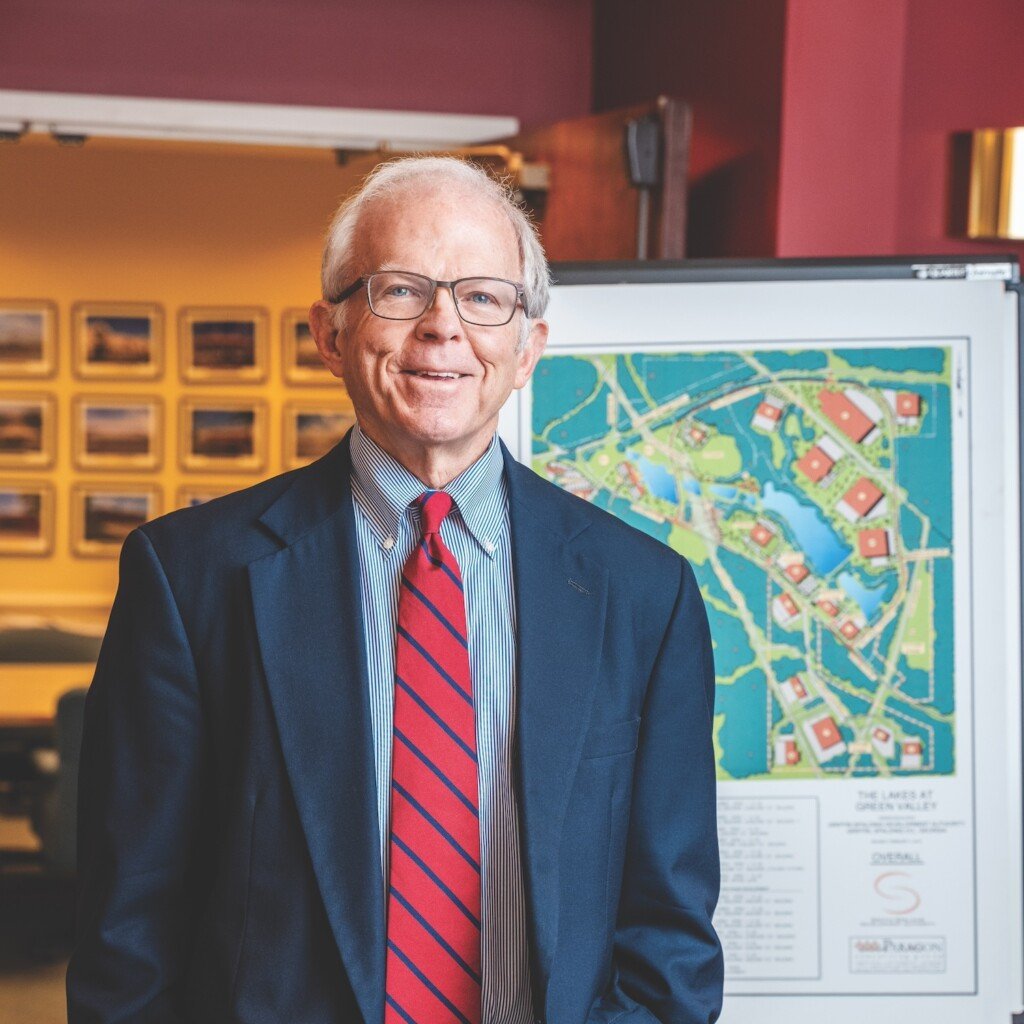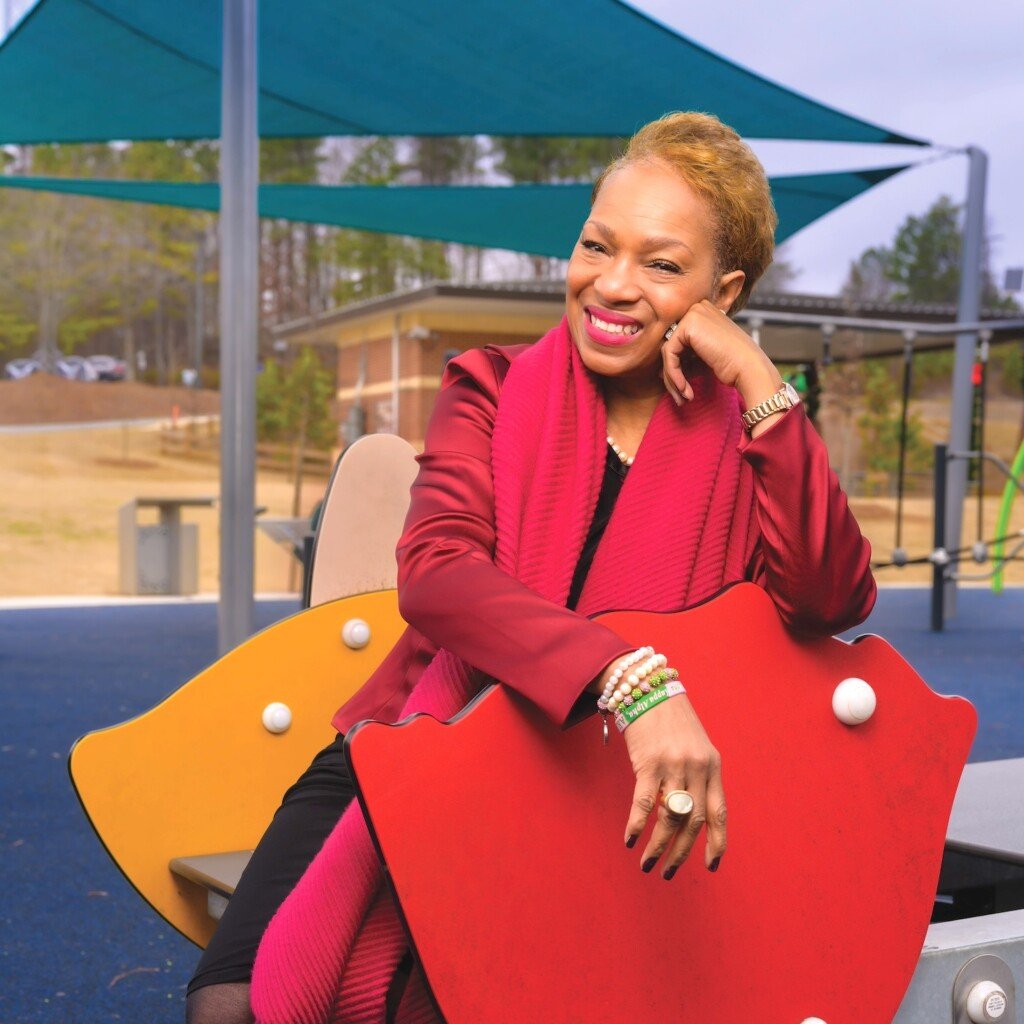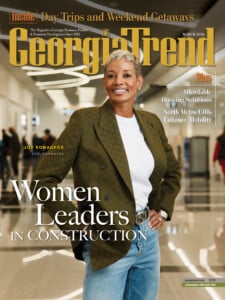Gwinnett County | Modern-Day Melting Pot
Diversity, Development, Progress

International Draw: Nick Masino, president and CEO of both the Gwinnett Chamber and Partnership Gwinnett. Photo credit: Eric Sun.
Gwinnett County is one of the 10 most diverse counties in the country, according to the U.S. Census Bureau. And if you include age as a factor, Niche.com says it’s the most diverse of all. That diversity is credited with helping build a strong economy, creating a vibrant cultural scene and pushing the county population to more than 1 million people, making it Georgia’s second largest county.
 “We are the most international, global county in Georgia because 27% of our population was born outside of the United States,” says Nick Masino, president and CEO of both the Gwinnett Chamber and Partnership Gwinnett. “We have Georgia’s largest populations of Koreans, Chinese, Vietnamese, Indians, Pakistanis, every country in Latin America… probably Bosnia as well; we have a huge Bosnian population.
“We are the most international, global county in Georgia because 27% of our population was born outside of the United States,” says Nick Masino, president and CEO of both the Gwinnett Chamber and Partnership Gwinnett. “We have Georgia’s largest populations of Koreans, Chinese, Vietnamese, Indians, Pakistanis, every country in Latin America… probably Bosnia as well; we have a huge Bosnian population.
“[Around] 150 languages are spoken in the homes of Gwinnett County.”
Masino says the county’s “really high quality of life, low cost of living and great public schools” are what makes it attractive to immigrants. Gwinnett County Schools and Duluth City Schools have strong English as a Second Language programs, and they help onboard and orient parents to the local school systems.
“Secondarily, we have been a corporate magnet for international companies for 40 years,” he says. “We have 100 German companies [and more than] 110 Japanese companies, and almost half of the Italian companies in Georgia are based in Gwinnett. International companies started coming to Gwinnett before international residents.”
Mitsubishi Electric Trane HVAC chose Gwinnett County to manufacture heating and air conditioning units there more than 30 years ago. Since then it has expanded four times, currently occupying a 550,000-square-foot facility, he says.
Recruitment and Redevelopment
Gwinnett encourages that growth. According to Masino, the chamber is “hyper focused” on economic development through its recruitment division, Partnership Gwinnett. Partnership Gwinnett is a 19-year-old initiative created by the chamber, the county, the school system, the cities and business leaders to recruit, retain and expand businesses.
“In 2024, Partnership Gwinnett recruited [companies bringing] 1,600 new jobs representing roughly $275 million in capital investment,” Masino says.
Gwinnett County’s reputation as a melting pot is also playing a key role in its plans to redevelop Gwinnett Place Mall into a mixed-use development. Last year, the county completed the purchase of the former Macy’s as part of its mall redevelopment plans, according to County Commission Chair Nicole Love Hendrickson, who calls the acquisition “a gamechanger.”

Transformative Acquisition: Last year, the county completed the purchase of the former Macy’s as part of its mall redevelopment plans. Photo credit: contributed.
“There’s a Sears, a Mega Mart and a Beauty Master still operating and holding out at the site, but we do own everything else,” she says. “Owning a majority of the site gives us more flexibility to reimagine and redevelop that area.”
While a request for proposals is still being worked up, Hendrickson reinforces the “Global Villages concept” that has been discussed over the past four years, based on public input. The concept is predominantly residential, with limited retail and office space. The focal points of the development will be an International Community Cultural Center and a Central Park.
“It will be a development unlike anything we’ve seen here in Georgia,” she says. “It will be something that people will travel from all over to come to.”
Hendrickson calls the mall redevelopment project a “legacy project,” anticipating a 20- to 25-year buildout. That’s not to say work hasn’t already begun. The first step was the county’s purchase of a portion of the mall site in 2021 for $23 million.
“This purchase was one of the first major projects we voted on when I came onboard as County Commission chair, and we have been moving the needle since that time,” she says. “We’re already doing a lot of the infrastructure work to make the property prime and ready for development.”

Legacy Project: Rendering of the interior of the International Community Cultural Center that will be a central part of the new Global Villages being built at the site of Gwinnett Place Mall. Photo contributed.
Meanwhile, Hendrickson highlights the county’s work to move the needle on challenges like crime and housing availability. In March, the county purchased an extended stay motel for $7.7 million to convert into 73 affordable housing units for seniors, homeless youth, young adults aging out of foster care and those making under $45,000 a year.
“We’re trying to address housing in a way that lifts people out of poverty,” she says. “This will provide a leg up for those populations and provide them a sense of stability. It’s a very unique project because it’s not like any other affordable housing we’ve done before because the focus is on particular populations.”
The county’s crime rate is down, and in May, Gwinnett’s Situational Awareness and Crime Response Center was one of just six counties statewide honored with a 2025 Georgia County Excellence Award.
Sustainable Region
In partnership with the Rowen Foundation, Gwinnett County is creating a 2,000-acre planned community that aims to be Georgia’s first climate resilient community.
In advance of its fifth anniversary this December, the Rowen Foundation has completed a $32 million “complete streets” infrastructure project, including multiuse pathways, underground utilities, green spaces and two miles of Georgia’s first green roads. The Greenroads Pilot Certified project, Georgia’s first- ever, incorporates climate-conscious features like biofiltration swales, narrower lanes to reduce concrete and heat island effects, and uses a variety of native plants selected for their microclimates.
“Even before vertical development begins, we have six living lab projects we are working on with students, universities and businesses from across the state,” Mason Ailstock, the foundation’s president and CEO, wrote in an email. “We are in the planning process to build the Rowen Convergence Center and kick off work on the mixed-use Rowen Village. From the beginning, we have said that Rowen’s real estate is just a platform to build a true knowledge community, and today we are well on our way to bringing together the thinkers, doers, leaders and innovators who will support our goals in agriculture, medicine and the environment.”

Climate-Resilient Community: Rowen Village, depicted in the rendering above, aims to be the first mixed-use community to use features that help reduce the effects of climate change. Photo credit: Rowen
This summer, the foundation and the University of Georgia launched a two-year hydrometeorology and land cover change observational study that seeks to understand how early-stage development affects local weather, land and water.
“We have a unique opportunity to understand the environment and microclimate of our site before development begins in earnest,” Ailstock wrote. “This will allow us to plan more carefully and inform development not just on our site, but across the state to create more resilient infrastructure for Rowen and others. This is increasingly important to prospects landing in our state.”
Pushing Boundaries
Founded as the county seat in 1821, Lawrenceville is the oldest city in Gwinnett County and the second oldest city in Metro Atlanta. Thanks to a recent agreement with the county and local legislative delegation, unanimous passage by the legislature and approval by the governor last session, the city’s boundaries may soon grow after remaining the same for more than 200 years.
“The county agreed to an annexation program that will be on the ballot in November 2026,” says Mayor David Still. “If that referendum passes, then we will be around 50,000 in population, as opposed to 30,000. We’re doing this because being a 200-plus-year-old-city, our boundary hasn’t changed, but our footprint has gotten smaller.”
Still explains the city can’t tax 40% of the property within its boundaries because it’s occupied by tax-exempt government properties.
“If the referendum passes, we’ll get down to 20% of property being tax exempt, and that’s a healthy level,” he says.
In addition to the need for more taxable properties, Still says a housing study revealed a shortage of executive housing, a stark contrast to other communities across Georgia that are struggling to provide more affordable housing.

Significant Development: The Lawrence hotel, illustrated in this rendering, will be branded as a Hilton Tapestry boutique hotel when it opens next summer. Photo credit: contributed.
“We’re trying to get a balance of housing for all socioeconomic levels,” he says. “Executive housing is anything from a $350,000 townhome at the lower end, to houses in the $700,000 to a $1 million range.”
To that end, the city has purchased around 50 acres of land around town to sell to developers, Still says. Similarly, the city issued $40 million in bonds to take over the construction of a hotel just off the Lawrenceville square.
“The hotel is going vertical now,” he says. “We are an unproven market. We felt it was a good investment to increase the value of our city and take it to the next level.”
The Lawrence hotel will be branded as a Hilton Tapestry boutique hotel. It will have 120 rooms, a conference center and a large restaurant, Still says. A general manager will oversee the day-to-day operations of the hotel, which the city hopes to sell to the private sector in the next three to five years, according to Still. The hotel is expected to open next summer.
Still says The Lawrence is the last major piece of a significant redevelopment of the downtown area that began in the late 2010s and included the Lawrenceville Arts Center, in which the city invested $31 million to renovate a former Methodist Church to be the new site of the Aurora Theatre. The Aurora and Georgia Gwinnett College are reimbursing half the cost over time.
“We added a 500-seat theater and there are five stages now in the facility,” he says. “It competes with the live performing theaters in Atlanta. We plan on continuing to own that.”
Food and Music City
In a previous incarnation, the Red Clay Music Foundry on Main Street in Duluth was also once a church, but today the city-owned building is home to Eddie Owen Presents, which includes a music venue, performance space and music school. Owen, former owner of Eddie’s Attic in Atlanta, uses his musical connections to bring performing songwriters to the Red Clay facility.

Successful Venture: Duluth Mayor Greg Whitlock outside Eddie Owen’s Red Clay Music Foundry. Photo credit: Eric Sun.
“We want to be known as a food city and a music city. We have high-quality acts coming through almost every day. We’re looking to promote the [Red Clay] theater more because no city around us has that,” says Mayor Greg Whitlock, noting renovations are underway there.
“We’ve upgraded the sound system and the seating,” he says. “Later this summer, we’ll be remodeling the lobby to improve the visitor experience. We’ll spend about $1 million on that. Most of that cost is related to moving the infrastructure.”
Duluth also has plenty of dining options. From white tablecloth establishments to barbecue, sushi, pizza and much more, Whitlock notes that there are 14 different restaurants downtown, with two new ones opening in the fall. The restaurant scene is so successful that Food Truck Fridays were revamped as Wednesday Flavors on Main, a rotating lineup of diverse food trucks, live music and entertainment, local vendors, and activities. It starts in late May and goes through mid-September.

Hump Day Fun: Wednesday Flavors on Main is a rotating lineup of food trucks, live music and entertainment, local vendors and activities. Photo contributed.
“Weekends start on Wednesday now,” he says. “We want to get more people downtown more frequently, so we can start recruiting and attracting restaurants inside the Perimeter to come outside the Perimeter. More activity every day of the week will also attract more retail.”
New City, Older Roots
Founded on July 1, 2012, Peachtree Corners is Gwinnett County’s largest city. The city’s roots were planted in the late ’60s, when businessman and Georgia Tech graduate Paul Duke pitched the idea of creating a planned community to include Technology Park Atlanta, a hub for high-tech industries.
The heart of those efforts is Curiosity Lab, where the city provides startups and established companies with a next-level testing environment in the real world, with real people, in a safe environment.
“Curiosity Lab continues to grow and continues to get a lot of international attention,” Mayor Mike Mason says. ”[In 2021] the French American Chamber of Commerce moved from downtown to Curiosity Lab. The chamber is steering French companies to Curiosity Lab to test and launch [new technologies].”

Grand Opening: Peachtree Corners Mayor Mike Mason, center, is joined by several people including first lady Marty Kemp and Gov. Brian Kemp, to his left and Georgia Tech President Angel Cabrera and Gwinnett County Board of Commissioners Chair Nicole Love Hendrickson, to his right, for the ribbon cutting of the Georgia Tech Atrium at the Curiosity Lab. Photo credit: contributed.
In April, Tech Park and Peachtree Corners came full circle when Georgia Tech announced the location of its first GT Atrium, a professional, academic and research innovation space located at Curiosity Lab.
“The governor took time out of his schedule to come out and talk about Georgia Tech’s Atrium and the president of Georgia Tech was here too, so it was a very important day,” Mason says.
The Atrium is designed to foster hands-on student research, industry collaboration and technology breakthroughs and offers an event venue for hosting conferences, seminars, exhibitions and social gatherings; workshops and networking sessions designed to foster professional development and collaboration; and private suites and conference spaces.
Sweet Investments
Named after a rumored incident of spilled sugar, the city of Sugar Hill is also a city on the rise.
“I’m excited for where we are as a community,” says Mayor Brandon Hembree. “We’ve made some good investments in parks, recreation and greenspace.”
About two years ago, the city opened Ridge Lake Park, and after a year of working with the Georgia Department of Natural Resources to stock the park’s lake with brim and catfish, it was opened for public fishing for the first time in May. Other new additions to the city’s growing green space portfolio are Gold Mine Park, a 9.2-acre park that serves as a trailhead for the Sugar Hill Greenway trail system.
“Now I think we have 6 miles of the greenway complete,” Hembree says. “In total, we plan a loop around our city … so we’re [almost] halfway done.”
In 2022, the city began soliciting community input for two additional parks, including one built around a Southern Red Oak that is 150 to 190 years old, and an adaptive use park for children with different abilities, the first park of its kind in the city, Hembree says.
“We are growing younger as a community and younger generations, they love to be outdoors,” he says, “so we’ve placed more emphasis on that.”
Making Progress
Providing recreational space for her constituents is also top of mind for Snellville Mayor Barbara Bender. Construction of a new community center in the city-owned T.W. Briscoe Park began in May.

Community Focused: Snellville Mayor Barbara Bender, outside The Grove at Towne Center. Photo credit: Woodie Williams.
“We are building two indoor basketball courts, with an indoor walking track, and it will have an aerobics room and two other multipurpose rooms, and new parks and recreation offices,” she says. “All in, it’s [an improvement totaling] about $13 million. The community doesn’t have anything like this.”
Snellville is also home to The Grove at Towne Center. The $140 million public-private partnership centers around The Grove, a central park that includes outdoor tables and chairs, a splash pad and a pavilion.
The city center contains retail and residential, a library, and a 750-space parking deck.
“We’ve been focused on The Grove for the last 10 years,” Bender says. “We are just maybe [a] month away from opening our showplace Market Building. There will be [a] brewery, plus food and a vendor hall. We’re feeling really good about what’s happening down there.”
And there’s more good news on the horizon. Georgia Gwinnett College’s new convocation center, which opened in 2024, will soon be home to the college’s inaugural men’s and women’s basketball teams starting with the 2025-26 academic year. Meanwhile, Northside Hospital-Gwinnett is nearing completion of a 15-story tower that will add more than 300 beds to its Lawrenceville campus, making it the largest facility in the Northside system.
Smart Redevelopment
Home to Georgia’s second largest elm tree, Norcross is experiencing “an economic renaissance,” according to Mayor Craig Newton.
“Over the past few years, we’ve seen a powerful combination of business expansion, smart redevelopment and intentional investment – all of it designed to lift up our community while protecting the character that makes Norcross unique,” he says. “Companies like Hilti, a global construction leader, have established significant operations right here in Norcross, bringing high-quality jobs and boosting our regional economic profile. The Northbelt Business Park is now home to over 90,000 square feet of newly occupied commercial space, and interest in our industrial corridors remains strong.”

Expanding Facility: Northside Hospital-Gwinnett is adding a new patient tower and medical office building, which is expected to be complete by the end of the year. Photo credit: Northside Hospital.
But economic growth is about more than just jobs, Newton says. It also includes revitalizing the city’s corridors, including the redevelopment of Buford Highway which is underway. The corridor is being reimagined as a “unifying thread,” complete with mixed-use developments, new retail and residential.
“So, when people ask what’s happening in Norcross, I tell them we’re building something special,” he says. “A city that grows not just bigger, but better. A city where prosperity has purpose and protecting our historic character and hometown feel is a high priority.”
A strong economy, award-winning public services and dynamic diversity are the key ingredients Gwinnett County combines to create a community that is, as its tagline says, “vibrantly connected.”
Local Flavor
Community Cornerstone
In the history of ribbon cuttings, there may have never been another one like it, or at least not one as well attended.
It was standing room only on June 16, as former students and teachers gathered for the grand opening celebration of the Hooper-Renwick Themed Library, a combined full-service library and museum dedicated to what was in the 1950s the only public high school for Black students in Gwinnett County. The school closed in 1968 as part of the desegregation process.
Among the attendees was Emanuel Austin, a former principal of the Hooper-Renwick School, and husband-and-wife teachers Jessie and Lorraine Walton, 92 and 93 years old, respectively.
“There were 105 people sitting down and more lining the walls around the room,” says Lawrenceville Mayor David Still, “and even more people outside touring the facility.”
The $20.5 million project was made possible through a partnership between the city, the county, the public library system and the Hooper-Renwick Legacy Preservation Committee. It’s the first themed library in the Southeast.
“The Hooper-Renwick School existed from 1951 until 1969,” says Constance Brown, a former student and chair of the Hooper-Renwick Legacy Preservation Committee. “After that, the school was used for some other functions, but by 2014 or so, the city had planned to redevelop that area. To our understanding, the school building was going to be demolished. Mrs. Rubye Neal got wind of what was happening, and she started a crusade to save the school.”
The restored and expanded facility spans 27,327 square feet and houses the relocated Lawrenceville branch of the Gwinnett County Public Library System, community gathering spaces and immersive exhibits that showcase accomplishments of former students. Memorabilia related to the school, including desks, graduation programs, attendance books, a piano and other items, are included in the museum exhibits.
Original elements of the school building include the restored façade and use of the original gym floor as flooring in the upper-level exhibit space.
“Ultimately, we could not save all of it, but the original part of the building, 12 classrooms and the principal’s office now [house] the library,” Brown says. “It’s very important to save that building because it stood for more than just a building. It was the nucleus of who we were, and coming in there and gutting it would be like saying you didn’t exist. That school was the cornerstone of the Black community, not just for Lawrenceville, but for small towns all around Gwinnett County.” 











